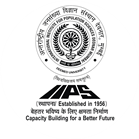- About IIPS
- Academics
- Study @ IIPS
- Departments
- Centres
- Controller of Examination
- Programme
- Distance and Online Education
- Training
- Facilities/Services
- Resources
- Virtual Learning
- Digital Initiatives (MHRD)
- Notice
- Seminars / Workshops / Conferences
- Conferences
- Publications
- Seminars
- Sponsored Research
- Workshops
- Collaboration
- National
- International
- NEP 2020
- Admission
- Courses
- Admission Bulletin
- TIME-TABLE For Admission 2025-26
- Model Question Papers
- Programme Coordinators
- Fellowships
- Academic Calendar
- International Students
- Visa Information
- Administration
- Faculty & Staff
- Research & Publications
- Library
- Information
- Right to Information
- Vigilance Officer
- Annual Report
- Director's Report
- Cells & Commitees
- Cells
- Commitees
- Committees of NEP 2020
- Staff Walfare Committee
- Cultural Committee
- Internal Committee
- Purchase Commitees
- Students Academic Committee
- Student Research Ethics Committee
- Anti-Ragging Committee
- Institutional Review Board
- Social Media Committee
- Prevention of Caste-based Discrimination Committee
- Code of Conduct and Professional Ethics
- National and International honours, Awards, Recognition, and Medals
- Online Facilities
- Employee's Corner
- Memorial Lectures
- Convocation
- IIPS Newsletters
- COVID 19 Information
- Life @ IIPS
Dr.
- Home
- Dr.
Abstract Content (not more than 300 word, should include: Introduction, Objective, Methodology, critical findings & Conclusion):
Introduction:
According to the WHO, in 2020, the estimated global maternal mortality rate was 287 deaths per 100,000 live births and 95% of these taking place in low and lower-middle-income countries (WHO, 2024). India's maternal mortality rate is alarmingly high A key factor resulting in sub-optimal motherhood experiences is antenatal care, and the associated human resource factors.
Objective:
The present study analyzes the patterns in different healthcare providers visited during NFHS-3 (2005-05) and NFHS-5 (2019-21) surveys for the ANC services and the specific services received across the caregivers. For this study, the data is analyzed for reproductive age women (15-49 years) reporting a live birth in the five years preceding the survey. The information on antenatal care (ANC) provider during pregnancy was obtained for the most recent live birth, for women who had at least one contact with a health worker during the three months’ period before the survey were involved.
Methodology:
Bivariate analyses are conducted to understand the variability in percentage distribution and the association between pregnant women receiving ANC services across type of service providers or institutions across place of residence, socioeconomic status and children ever born.
Findings:
There has been significant improvement in doctor’s involvement for the rural and poor women. The results from NFHS-5 data depict the involvement of ASHA workers in providing ANC services for pregnant women, might have shared the loads from doctors. Percentage women obtaining supplementary nutrition, health and nutrition education and any other benefit has seen significant improvement between NFHS-3 and NFHS-5.
Conclusion:
Addressing the link between how these issues of availability and births influence each other can improve reducing inequalities in maternal and childcare outcomes in India, and addressing universal health coverage under SDG-5.
Abstract theme:
In case of not been selected for oral presentation, do you want to be considered for the poster presentation ?:
Yes
Do you require financial support to attend the seminar ? (Not applicable for virtual meet):
Yes-full
Gender:
Male
Evaluation Status:
No
